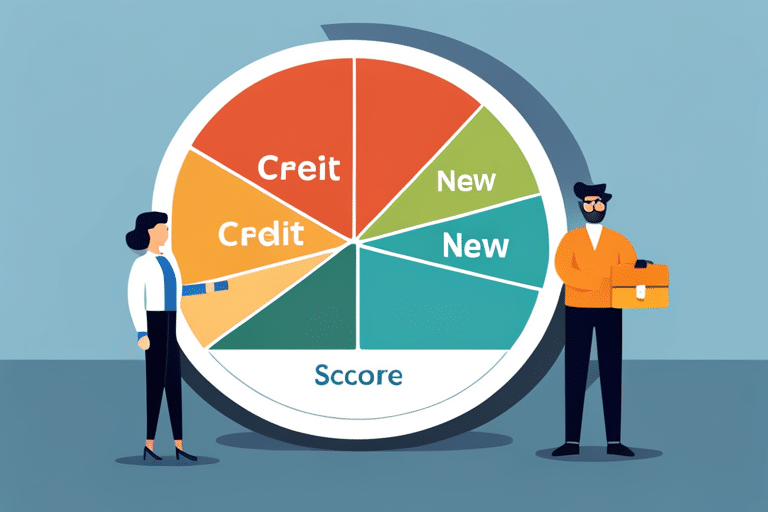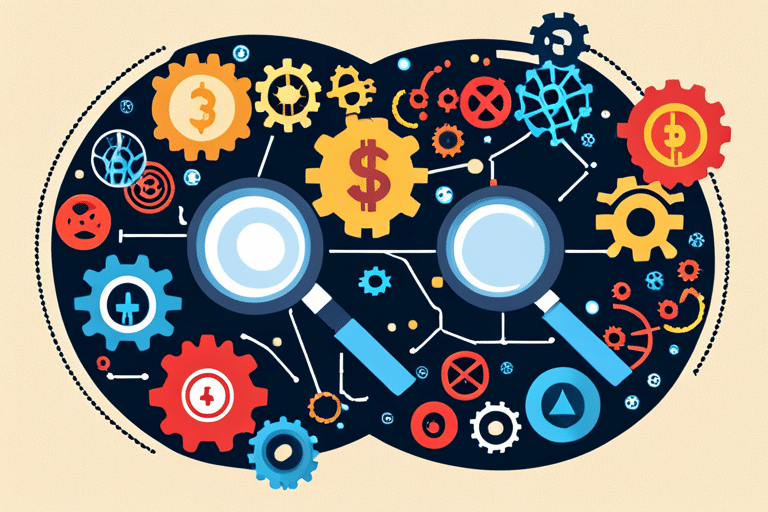Are you ready to unravel the secrets behind your credit score? Brace yourself for a journey through the intricate maze of calculations and discover why it holds such power over your financial life.
In this article, we will demystify credit scores, shedding light on how they are calculated and why they matter.
Get ready to dive into the world of credit scoring with a sense of curiosity and excitement as we explore the inner workings of this mysterious number.
Let’s begin!
Key Takeaways
- Payment history, credit utilization, length of credit history, and types of accounts are key components that influence credit score calculation.
- Credit scores range from poor to excellent and determine the interest rates for loans.
- Having multiple credit cards can improve your credit score if managed responsibly.
- Lenders rely on credit scores to assess the risk of lending money and determine loan approval.
The Components of a Credit Score

The components of a credit score are like puzzle pieces that come together to create a picture of your financial health. Picture this: you’ve got payment history, credit utilization, length of credit history, types of accounts, and new credit applications. These five elements work in harmony (or sometimes not-so-harmoniously) to determine your credit score.
First up is payment history. This little guy carries some serious weight when it comes to your score calculation. It’s like the captain of the team, making sure everyone else is performing at their best. So make sure you pay those bills on time and in full!
Next, we have credit utilization. This one’s all about how much of your available credit you’re using. Think of it as a balancing act – you want to keep your balances low while still using some of that sweet plastic power.
Then there’s length of credit history. This component takes into account how long you’ve been borrowing money and managing your finances responsibly. The longer the better, so hold onto those old accounts for dear life!
Types of accounts also play a role in determining your score. Lenders like to see a diverse mix of loans and lines of credit on your report; it shows them that you can handle different types of financial responsibilities.
Lastly, we have new credit applications. Every time you apply for more credit, it leaves a mark on your report – kind of like those temporary tattoos from childhood that seemed cool at the time but just ended up being regrettable decisions.
Understanding these different components and their weightings will help you grasp why certain actions affect your overall score. Now let’s dive deeper into understanding credit score ranges…
Understanding Credit Score Ranges

Understanding credit score ranges can be essential for managing your financial health. Your credit score is a three-digit number that represents your creditworthiness and is used by lenders to determine if they should approve your loan application and at what interest rate. Many people have misconceptions about credit scores, so let’s debunk some common myths before diving into the ranges.
| Credit Score Range | Rating |
|---|---|
| 300-579 | Poor |
| 580-669 | Fair |
| 670-739 | Good |
| 740-799 | Very Good |
| 800-850 | Excellent |
Contrary to popular belief, having multiple credit cards does not automatically lower your score. In fact, it can actually improve it if you use them responsibly! Another myth is that checking your own credit score will hurt it. Don’t worry, checking your own score (known as a soft inquiry) won’t have any negative impact on it whatsoever.
Why do these ranges matter? Well, they play a significant role in determining the interest rates you’ll receive when applying for loans. The higher your credit score, the better chance you have of getting approved for lower interest rates. This means more money in your pocket in the long run!
Now that you understand the different credit score ranges and their implications on loan interest rates, let’s explore the factors that influence your credit score and how you can improve it even further.
Transitioning into the next section: So, what exactly goes into calculating a credit score? Let’s find out!
Factors That Influence Your Credit Score

Contrary to popular belief, having multiple credit cards doesn’t automatically lower your score. In fact, it can actually improve your credit score if managed responsibly. So don’t be afraid to swipe that plastic and collect those reward points!
One important factor that influences your credit score is your credit utilization. This refers to the amount of credit you’re using compared to the total amount available to you. Generally, it’s recommended to keep your overall utilization below 30%. But here’s where having multiple cards can work in your favor. By spreading out your charges across different cards and keeping their individual balances low, you can effectively lower your overall utilization and boost your score.
Another crucial factor is payment history. Timely payments show lenders that you’re responsible and trustworthy when it comes to managing debt. Having multiple cards gives you more opportunities to demonstrate a solid payment history. As long as you make all of your payments on time, each card will contribute positively towards building a strong credit profile.
Of course, it’s important not to go overboard with the number of cards you have or constantly max them out just because you can. That would definitely hurt your score! The key is finding the right balance between having enough cards to demonstrate responsible borrowing behavior without getting overwhelmed by excessive debt.
The Importance of Credit Scores for Lenders

Lenders rely on credit scores to assess the risk of lending money. It’s like a secret code that tells them whether you’re trustworthy or not. But don’t worry, understanding credit score impact and analysis is easier than deciphering hieroglyphics!
Imagine you’re a lender, sitting in your office, trying to decide whether to loan someone money. You’ve got stacks of applications from people who want to borrow cash for all sorts of reasons – buying a car, starting a business, going on vacation (hey, we all need some R&R!). But how do you know who will pay you back and who might disappear into thin air?
That’s where credit scores come in. They’re like your financial report card – they show lenders how responsible and reliable you are with money. If you’ve paid bills on time, kept your debt low, and managed your finances well, then your credit score will be high – think straight A’s! On the other hand, if you’ve missed payments or maxed out every credit card in sight (we’ve all been there), then your score will be lower – more like a C-.
When lenders analyze your credit score, they can quickly determine if lending money to you is risky or not. A high score means they’ll likely get their money back with interest (cha-ching!), while a low score means there’s a higher chance they won’t see their dollars again (ouch!).
Ways to Improve Your Credit Score

Improving your credit score can be achieved through responsible financial habits, such as paying bills on time and keeping debt levels low. But what exactly does that mean? Let’s break it down for you in a fun and easy-to-understand way.
Imagine you’re building a tower out of blocks. Each block represents a different aspect of your credit score. To create a strong foundation, you need to focus on two key areas: credit utilization and building a positive credit history. Take a look at this table to see how these factors affect your score:
| Aspect | Importance | How to Improve |
|---|---|---|
| Credit Utilization | 30% | Keep your debt levels low by using only a small portion |
| of your available credit | ||
| Building Credit | 35% | Pay all bills on time and in full |
| History | Avoid opening too many new accounts |
Managing your debt is crucial when it comes to improving your credit score. Lenders want to see that you are responsible with the money you borrow. By keeping your balances low, you show them that you can handle credit responsibly.
Building a positive credit history is equally important. This means paying all of your bills on time, every time. Late payments can have a significant negative impact on your score, so make sure to stay organized and pay attention to due dates.
Frequently Asked Questions
How Long Does It Take for Negative Information to Be Removed From My Credit Report?
Don’t fret! Negative info doesn’t stick around forever. It usually takes about 7 years for it to vanish from your credit report, but its impact on your creditworthiness can vary. Keep building that good credit!
Can Checking My Credit Score Frequently Negatively Impact My Credit?
Checking your credit score frequently doesn’t negatively impact your credit. It’s like looking in the mirror often – it won’t make you uglier. So go ahead, stay on top of your financial game!
What Is the Minimum Credit Score Needed to Qualify for a Mortgage?
To qualify for a mortgage, you’ll need a minimum credit score. It’s like the secret code to unlock your dream home! So keep an eye on that score and work towards getting it higher. You got this!
Do All Lenders Use the Same Credit Scoring Models?
Do all lenders use the same credit scoring models? Well, here’s the deal: credit score discrepancies can happen because not all lenders rely on the exact same model. It’s like trying to find your favorite flavor of ice cream at different shops.
Can My Credit Score Be Affected by Someone Else’s Financial Actions, Such as a Joint Account Holder?
Yes, someone else’s financial actions, like a joint account holder, can impact your credit score. So choose wisely when sharing accounts! Their mistakes could become yours. Protect your credit!
Conclusion
Congratulations! You’ve successfully embarked on the journey of demystifying credit scores. Just like a magical recipe, your credit score is made up of various ingredients that determine your financial fate.
Remember, these numbers hold immense power over your financial kingdom, influencing lenders and shaping your borrowing opportunities. But fear not! With a little effort and determination, you can conquer any credit score dragon and pave the way to a brighter financial future.
So go forth, my friend, armed with knowledge and watch as your credit score transforms into a majestic unicorn of financial success!

